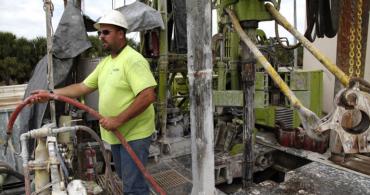
Bad timing for St. Petersburg Mayor Rick Kriseman.
Less than 12 days from Election Day, Kriseman learns Pinellas and Pasco State Attorney Bernie McCabe "will reconsider criminal charges associated with sewage dumps over the past two years in St. Petersburg."
According to the Thursday Tampa Bay Business Journal, McCabe said he will base his decision on a Florida Fish and Wildlife Conservation Commission (FWC) report recommending 89 felonies and 103 first-degree misdemeanors against the city.
Add to this, news of a far larger sewage spill during Hurricane Irma than first was reported: Instead of 430,000 gallons, the revised figure was 15.5 million gallons of partially treated sewage, all flushed underground.
The Business Journal claims Rep. Kathleen Peters, R-Treasure Island, has plans to invite FWC to a Pinellas County Legislative Delegation meeting to address the report's findings. Peters is also working with the Florida Department of Environmental Protection to identify possible legislation protecting waterways from sewage dumps.
McCabe, whose report predates Hurricane Irma, has said he is only looking at whether charges are appropriate against an individual or individuals, that charging the Gulf Coast city of 250,000 as a whole isn't worth the time that goes into pursuing the case because only fines can be levied in criminal cases against a city.
Despite 20 years of sewage failures in St. Pete, it's the recent dumps that caused the most attention -- with Kriseman, in office since 2013, taking the brunt of the criticism. Kriseman's decision to close the Albert Whitted plant led to a spill of some 200 million gallons of sewage into waterways in 2015 and 2016.
McCabe told the Business Journal the report was complete in October 2016, but only recently shared with his office. The report also found 700 million to 800 million gallons of sewage was pumped into underground injection wells in 2016 after Hurricane Hermine. The report called the injection well incident an "illegal wastewater discharge" that was "unprecedented in state history."
The report at issue doesn't include the spills during Hurricane Irma, perhaps because "Hurricane Irma has produced circumstances beyond the reasonable control" of some treatment plant operators, regional EPA chief Trey Glenn said Wednesday in a letter to Noah Velenstein, secretary of the Florida Department of Environmental Protection.
But then another major city faux pas showed up -- one that wasn't beyond the city's reasonable control.
As of Monday, Sept. 11, St. Petersburg had reported only four spills. The largest, totaling about 430,000 gallons of partially treated wastewater, overflowed from a treatment plant holding tank, while the others were at manholes.
Trouble is, somebody among city staff wasn't forthcoming. According to the Oct. 25 Times, Mayor Kriseman said "he didn't know until recently that after the September storm, the city's Northeast sewage plant flushed 15.5 million gallons of partially treated sewage down injection wells deep into the aquifer." The Florida DEP calls that a sewage spill. That news wasn't released until Sept. 13, two days after the report of 430,000 gallons spilled.
The city is allowed to flush only reclaimed water down its wells, writes the Times. "But this sewage was not disinfected properly with chlorine or tested for dangerous bacteria before being pumped into underground injection wells or storage tanks. About 5 million gallons was sent into the tanks. So altogether, 20.5 million gallons wasn't properly disposed of after Irma."
Meanwhile, in less than two weeks Kriseman is up for re-election in a contentious neck-and-neck contest against former Mayor Rick Baker. Baker has hammered away at Kriseman's decision making, particularly on the sewage issue, pointing to the current mayor's inability to handle decisions that keep his citizens safe and healthy.
Asked by the Tampa Bay Business Journal if the timing of the report's release might suggest it's a Baker campaign stunt, McCabe said no, he doubts it. "“If I really thought that Florida Fish and Wildlife [Conservation Commission] was trying to be involved in political stuff, that would bother me a lot,” he said.
Sunshine State News was unable to reach either Kriseman or Baker late Thursday.
Reach Nancy Smith at nsmith@sunshinestatenews.com or at 228-282-2423. Twitter: @NancyLBSmith


